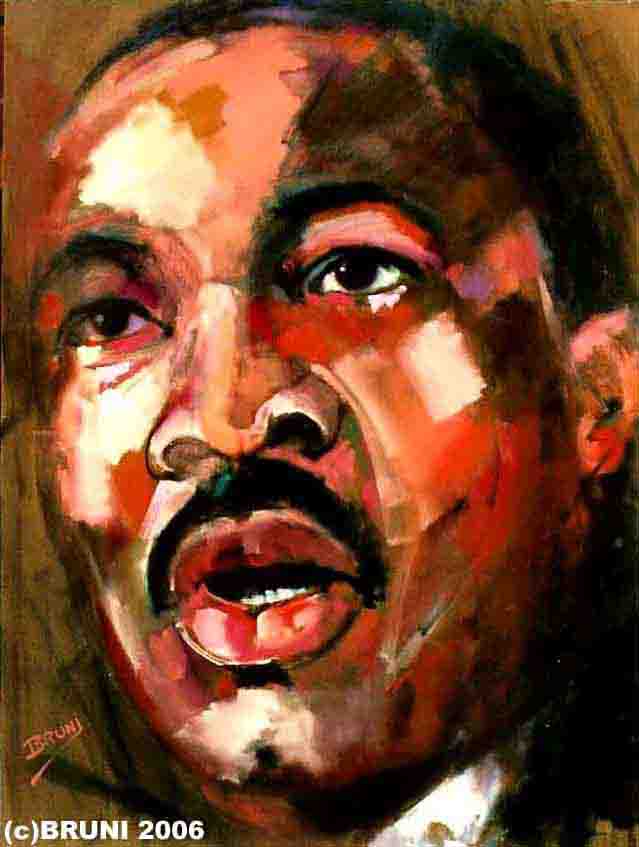Great Throughts Treasury
This site is dedicated to the memory of Dr. Alan William Smolowe who gave birth to the creation of this database.

Martin Luther King, Jr.
American Clergyman, Activist, African-American Civil Rights Leader, Assassinated
"Agape means understanding, redeeming good will for all men. It is an overflowing love which is purely spontaneous, unmotivated, groundless, and creative. It is not set in motion by any quality or function of its object? Agape is disinterested love. It is a love in which the individual seeks not his own good, but the good of his neighbor. Agape does not begin by discriminating between worthy and unworthy people, or any qualities people possess. It begins by loving others for their sakes. It is an entirely ?neighbor-regarding concern for others,? which discovers the neighbor in every man it meets. Therefore, agape makes no distinction between friends and enemy; it is directed toward both. If one loves an individual merely on account of his friendliness, he loves him for the sake of the benefits to be gained from the friendship, rather than for the friend?s own sake. Consequently, the best way to assure oneself that love is disinterested is to have love for the enemy-neighbor from whom you can expect no good in return, but only hostility and persecution."
"Another basic point about agape is that it springs from the need of the other person ? his need for belonging to the best in the human family? Since the white man?s personality is greatly distorted by segregation, and his soul is greatly scarred, he needs the love of the Negro. The Negro must love the white man, because the white man needs his love to remove his tensions, insecurities, and fears."
"Nonviolent resistance [requires] a willingness to accept suffering without retaliation, to accept blows from the opponent without striking back? The nonviolent resister is willing to accept violence if necessary, but never to inflict it. He does not seek to dodge jail. If going to jail is necessary, he enters it ?as a bridegroom enters the bride?s chamber.?"
"Nonviolence ? does not seek to defeat or humiliate the opponent, but to win his friendship and understanding. The nonviolent resister must often express his protest through noncooperation or boycotts, but he realizes that these are not ends themselves; they are merely means to awaken a sense of moral shame in the opponent. The end is redemption and reconciliation. The aftermath of nonviolence is the creation of the beloved community, while the aftermath of violence is tragic bitterness."
"It must be emphasized that nonviolent resistance is not a method for cowards; it does resist. If one uses this method because he is afraid or merely because he lacks the instruments of violence, he is not truly nonviolent. This is why Gandhi often said that if cowardice is the only alternative to violence, it is better to fight? The way of nonviolent resistance ? is ultimately the way of the strong man. It is not a method of stagnant passivity? For while the nonviolent resister is passive in the sense that he is not physically aggressive toward his opponent, his mind and his emotions are always active, constantly seeking to persuade his opponent that he is wrong. The method is passive physically but strongly active spiritually. It is not passive non-resistance to evil, it is active nonviolent resistance to evil."
"Nonviolent resistance ? avoids not only external physical violence but also internal violence of spirit. The nonviolent resister not only refuses to shoot his opponent but he also refuses to hate him. At the center of nonviolence stands the principle of love. The nonviolent resister would contend that in the struggle for human dignity, the oppressed people of the world must not succumb to the temptation of becoming bitter or indulging in hate campaigns. To retaliate in kind would do nothing but intensify the existence of hate in the universe. Along the way of life, someone must have sense enough and morality enough to cut off the chain of hate. This can only be done by projecting the ethic of love to the center of our lives."
"Unearned suffering is redemptive. Suffering, the nonviolent resister realizes, has tremendous educational and transforming possibilities."
"Nonviolent resistance ? is base don the conviction that the universe is on the side of justice. Consequently, the believer in nonviolence has deep faith in the future. This faith is another reason why the nonviolent resister can accept suffering without retaliation. For he knows that in his struggle for justice he has cosmic companionship. It is true that there are devout believers in nonviolence who find it difficult to believe in a personal God. But even these persons believe in the existence of some creative force that works for universal wholeness. Whether we call it an unconscious process, an impersonal Brahman, or a Personal Being of matchless power of infinite love, there is a creative force in this universe that works to bring the disconnected aspects of reality into a harmonious whole."
"The attack is directed against forces of evil rather than against persons who happen to be doing the evil. It is the evil that the nonviolent resister seeks to defeat, not the persons victimized by the evil. If he is opposing racial injustice, the nonviolent resister has the vision to see that the basic tension is not between the races? The tension is, at bottom, between justice and injustice, between the forces of light and the forces of darkness?. We are out to defeat injustice and not white persons who may be unjust."